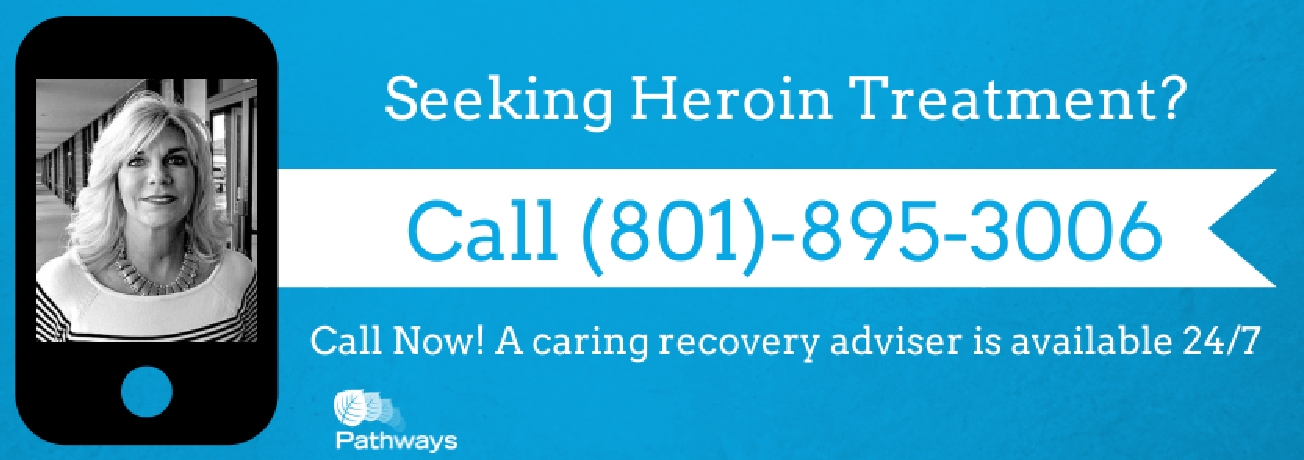You Have the Power to Be Free from Heroin Addiction
You can overcome heroin addiction and enjoy your life free from dependence. The first step is making the choice to take responsibility for your actions. This can seem very hard to do. But, your choices, starting with that one, can lead you through a process too soon living a better, more fulfilling life.
If you need help in overcoming drug addiction, or if you would like to get more information about our Utah heroin addiction treatment program, contact Pathways Real Life Recovery heroin rehab center in Utah at (801) 895-3006. We're here to answer your questions and explain options Pathways offers for heroin addiction treatment. Ask for an appointment for your free assessment. We accept insurance.

About Heroin Addiction
Heroin is a derivative of morphine, an opioid. It is an extremely addictive illegal depressant. In fact, the National Institute on Drug Abuse (NIDA) suggests that approximately 23 percent of heroin users become dependent upon the drug. Other NIDA statistics reveal that the number of heroin users in the US has escalated, nearly doubling in just the seven year period from 2005 to 2012 (increasing from 380,000 to 670,000).
Heroin rapidly accesses and binds to proteins that function as opioid receptors on cells in many areas of the brain, especially in regions involved in feelings of pain and pleasure. Other opioid receptors, located in the brain stem, control processes including breathing, blood pressure, and arousal. The opioid medications are attractive to users due to their effectiveness in generating a sense of pleasure and well-being by affecting these brain regions involved in feelings of reward.
Various forms of heroin: White or brown powder, or black substance (like tar).
Methods of use: Heroin can be used by injecting, smoking, swallowing, or snorting it. The rate at which heroin connects with opioid receptors in the brain depends upon the method used to take the drug.
Common names for heroin: Heroin has many street names, including Smack, Junk, Horse, Black tar, Skag, Dope, Big H, Brown Sugar. Frequently, heroin is mixed with other substances, such as quinine sugar, starch, or even certain types of poison to enhance the drug's effects.
Health Consequences of Heroin Use
Long-term use of heroin can lead to severe health effects, including one or more of the following kinds of diseases, organ damage, or other complications.
- Damage to heart, heart lining, heart valves
- Damage to veins, and arteries
- Slowed breathing
- Infections or abscesses (swollen, pus-filled tissue)
- Kidney disease
- Impeded brain production of chemicals signaling pleasure
- Reduced brain cells
- Sleep problems
- Stomach cramps, constipation
- Liver disease
- Lung problems, including forms of pneumonia
- Infectious diseases (HIV, Hepatitis, or others)
- Death
Heroin Addiction Treatment Process
A universal approach to heroin addiction treatment does not work for all individuals struggling with heroin addiction. At Pathways, each patient works with therapists, counselors, and other specialists to create a unique treatment program to meet individual needs and goals. Treatment may include the following.
- Detox: Medically managed detoxification is the first stage of treatment for recovery from Heroin addiction. Professional detox practitioners, with medical assistance, employ specially formulated medication therapies to simulate some effects of heroin. The medications do not cause patients who have a history of heroin use to experience a sense of altered consciousness or feeling of being high. The medication treatment is utilized during detox to facilitate the process by helping patients feel focused, strong and healthy. The medications are decreased until the patient is no longer taking any replacement medication.
- Outpatient treatment: Treatment may be intensive outpatient in the beginning. Patients may attend multiple weekly outpatient treatment sessions. After completing the more intensive treatment, out-patients may then transition into a more regular routine of treatments. This involves meeting less frequently and for fewer hours weekly and is focused on helping sustain recovery.
- Cognitive-behavioral therapy: This part of addiction therapy aims at helping a patient first recognize situations in which people in recovery are most likely to become motivated to use drugs, and then learn ways to avoid and cope with those circumstances.
- Multidimensional family therapy: For an adolescent who uses heroin, and for his or her family, this form of therapy can be exceptionally useful to address a range of potential influences on the pattern of drug abuse. The therapy is designed to help improve the family's overall functioning.
- Motivational interviewing: This treatment is designed to help patients make the very most of their readiness to change their behavior, and to get treatment.
- Contingency management: Motivational incentives are employed in this kind of treatment to provide positive reinforcement of the patient's recovery efforts and to encourage maintaining abstinence from drugs.
- Long-term relapse prevention: Continuing preventive treatment is essential to staying drug-free over the long term. Near the completion of treatment, a Pathways exit counselor will work side-by-side with you to develop your own plan for relapse prevention, with a schedule to help you maintain your success. And, Pathways provides support by following up with you for three years after you leave treatment. Read 7 Relapse Prevention Tips Here.
Principles of Successful Heroin Addiction Recovery
Heroin addiction can severely impact brain functioning and behavior. The disease is complex, but it can be successfully treated. It is not necessary for treatment to be voluntary for it to be effective. The most common forms of treatment include counseling, along with other behavioral therapies. Frequently, medications are important for treatment, in conjunction with behavioral therapies. Successful treatment requires acting on the following principles.
- People need ready access to treatment.
- Treatment must be individualized to address each patient's unique needs.
- Treatment must attend to all needs of the patient, not focus only on the drug use issue.
- Continuous monitoring of drug use must be maintained during treatment.
- As patient's needs change throughout treatment, the individual plan must be frequently reviewed and modified.
- The patient must stay in treatment for a sufficient length of time.
NOTE: Treatment should examine the possibility of other mental disorders that may exist.
Additionally, because heroin is an opioid typically taken by intravenous injection, it is linked to transmission of communicable diseases such as Human Immunodeficiency Virus (HIV), Hepatitis B and C, and Tuberculosis. Therefore, the treatment program should test addiction patients for these, among other infectious diseases.
Patients should be educated on steps to reduce their risks of contracting these and other blood-borne diseases that can occur as consequences of sharing contaminated needles and other drug paraphernalia, and from high-risk sexual behavior. This education is necessary, as drug abuse can significantly contribute to the potential for these behaviors.

Pathways Objectives
The aim of Pathways treatment professionals is to help our clients become free from a sense of shame or guilt that can promote continual self-damaging cycles. Our purpose is to help individuals suffering in addiction accept their need for a real and lasting solution and to provide them with the necessary opportunities to change the way they're living. We treat our patients with the love, dignity, and respect that conveys our most basic beliefs as individuals who care about helping other people.
If you need help in overcoming heroin addiction contact the Pathways Real Life Recovery heroin rehab center in Utah at (801) 895-3006.
You do not have to try to go through the recovery process alone. We are here to help you. Pathways professionals treat heroin addiction first by managing the physical withdrawal for you. And, then we work through the full recovery process with you to address the issues behind heroin addiction.
The explanation for Pathways' success is that we understand that each person is an individual. We know it doesn't work to just treat the symptoms of addiction. Our highly skilled professional team provides you with opportunities and tools to discover the deeper personal causes of your addiction. We work with you to examine motives for actions, to develop inner-forgiveness, and to understand the underlying issues leading to destructive behaviors.
Pathways' outpatient programs go beyond drug addiction to help our clients gain control over other personal challenges, such as co-occurring disorders, marital difficulties, addiction to pornography, and other problems. Our strong focus is on helping our patients gain robust confidence and personal tools for maintaining a future free from heroin.

